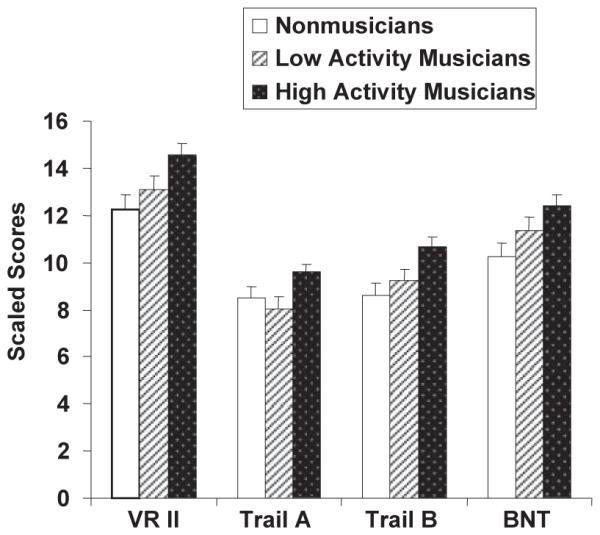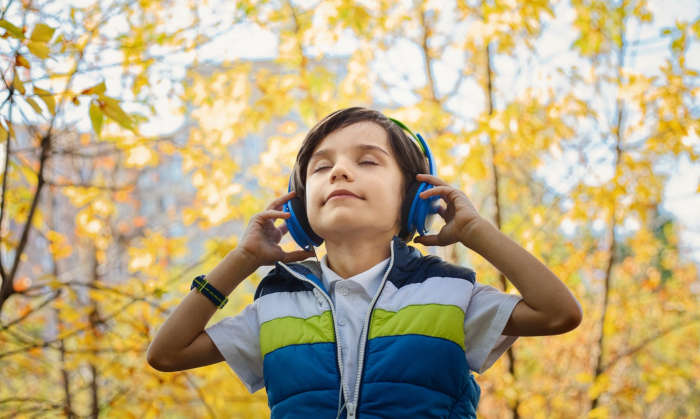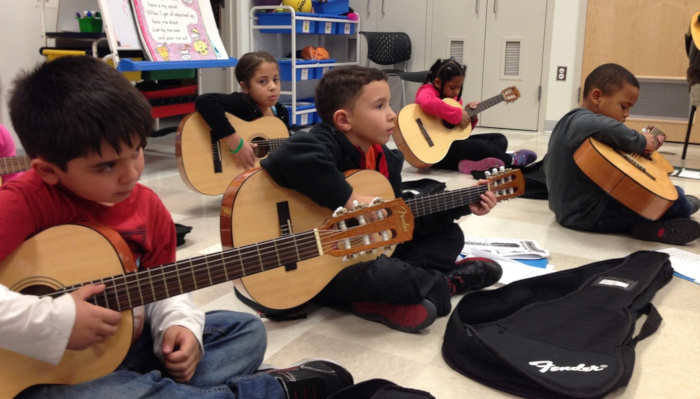
So you’re curious about gifting a musical instrument to someone you care about.
Maybe you’re trying to earn brownie points to become your nephew’s new favorite aunt. Or maybe your significant other has a burning creative side that’s begging to be unleashed. Or it might just be time to treat yourself and explore your own potential for musical expression.
Whatever the case, if you’re looking for practical reasons why a musical instrument is the perfect gift for you or someone you care about, you’ve come to the right place. I won’t try to convince you by telling you that not learning a musical instrument is one of former President Barack Obama’s biggest regrets (it is).
And I won’t guarantee your son or daughter’s acceptance at the Juilliard School of Music just by taking ukulele lessons a couple times a week (Juilliard’s 2017 acceptance rate was about six percent, on par with that of Harvard University).
If you’re at all like me, you prefer to consider concrete benefits when making decisions. That’s why I’ll spare you the more subjective arguments here.
So let’s get to the reasons why a musical instrument may be the perfect gift.
Health benefits of becoming musically active
There are countless scientific studies pointing to several health benefits of playing musical instruments. That’s right. Playing a musical instrument, even if only occasionally, can actually help you live longer.
1. Playing a musical instrument can lower blood pressure
Do you or does someone you know live a stressful life?
According to 2018 statistics published by the American Heart Association, 103 million Americans have high blood pressure, or hypertension. The leading cause of cardiovascular-related deaths, hypertension affects almost one third of adults worldwide.
And that number is growing.
Epidemiologist Dr. Paul Muntner notes, “With the aging of the population and increased life expectancy, the prevalence of high blood pressure is expected to continue to increase.”

A study of the neurocardiological differences between musicians and control subjects found active music making has similar benefits to physical exercise.
Researchers found participants who practiced a musical instrument for at least one hour a day had significantly lower blood pressure and a lower heart rate than those who didn’t.
A musical instrument may be the perfect gift for that person in your life who’s always stressed out.
2. Playing music strengthens the body’s protection against disease
Unless you’ve been living under a rock, you’ve probably heard of myriad lifestyle choices that will help you get sick less often and less severely—some more controversial than others.
But did you know listening to and playing music are proven ways to strengthen the body’s immune system?
Researchers at McGill University in Montreal analyzed 400 studies on the benefits of music on mental and physical health in 2013. Their analysis revealed that listening to and playing music:
- Increases production of the antibody immunoglobulin A in the body
- Increases production of natural killer cells, which attack invading viruses; and
- Reduces levels of cortisol, a stress hormone that can weaken the immune system
The next time you’re considering what to give that coworker who’s always catching the flu and infecting the rest of the office (Megan, I’m looking at you) forget the vitamin C supplements. Give them the gift of music.
3. Performing music relieves pain
I’ve been an active runner since before my high school days of competitive cross-country running. I’ve generally found that any slight pain or discomfort I feel in the first mile or so of a run soon dissipates, giving way to what’s often called the “runner’s high”.
This common euphoric feeling comes from endorphins, a kind of natural painkiller the body releases in response to pain signals.
According to a study by Oxford psychology professor Robin Dunbar, performing music can achieve the same effect. Dunbar compared the pain tolerances of people in separate experiments:
- People who had been actively engaged in a communal church service that included singing and clapping vs. people who had been less engaged in a more passive prayer meeting
- People who had been playing in a drum circle vs. people who had been listening to music or watching an instructional video
- People who had been dancing vs. people who had been rehearsing music
Dunbar found that in all three experiments the first, more active group of people had a much higher pain tolerance than the second, more passive group. He concluded that performing music released endorphins.
4. Playing music relieves anxiety and depression
The World Health Organization reported in 2018 that more than 300 million people suffer from depression worldwide. Depression is also the leading cause of disability.
Anyone who’s a fan of blues music knows that musicians have long used their art to express sadness. But can playing music actually make clinically depressed people feel better?

Yes, making music can help overcome depression, according to a study from the University of Jyväskylä in Finland. Researchers divided 79 adult participants who were clinically diagnosed with depression into two separate treatment groups:
- 46 received anti-depressants, counseling and psychotherapy
- 33 were offered 20 hour-long sessions with a music therapist who helped them make music with drums and mallet instruments
The researchers found that the group of participants that underwent music therapy showed far lower symptoms of depression and anxiety three months later.
Dr. Mike Crawford from Imperial College London reiterated the findings, saying, “This is a high-quality randomized trial of music therapy specifically for depression, and the results suggest that it can improve the mood and general functioning of people with depression.”
I want to be clear. Giving someone a musical instrument should not be considered a substitute for professional medical care.
Just know that the act of playing music has been shown to improve mood in some people. For this reason, a musical instrument can be a fantastic gift idea for the people you care about.
5. Practicing a musical instrument may preserve cognitive performance
An estimated 50 million people are living with dementia worldwide. And there are almost 10 million new cases every year.
Studies have shown that frequent participation in cognitively stimulating activities can lower a person’s risk of Alzheimer’s disease, a form of dementia accounting for 60-70 percent of cases.
Playing a musical instrument is one such activity that seems to preserve cognitive function in advanced age. In a study of the relationship between musical activity and cognitive aging researchers divided 70 adults ages 60-83 years into the following groups:
- High-activity musicians (10+ years of experience)
- Low-activity musicians (1-9 years of experience); and
- Nonmusicians
Measurements of cognitive ability reveled that high-activity musicians outperformed the other groups in both nonverbal memory and executive processes (e.g. attention control, problem solving).

Researchers discovered no significant relationship between the age range during which participants within the same group were musically active and their performance. This suggests two important implications:
- The cognitive benefits of playing a musical instrument are lifelong. They continue well into a person’s advanced years even after a person ceases to be musically active.
- Musical activity across a person’s life span, rather than at a particular critical age, is the distinguishing factor in the differences found in cognitive ability.
It’s never too early or late in life to begin realizing the cognitive benefits of playing a musical instrument.
Participation in music helps people form meaningful personal relationships
Besides the physical and neurological health benefits of playing a musical instrument, musical activity can also improve a person’s interpersonal life.
Studies have suggested musical experience can strengthen social bonds and make people more empathetic.
6. Shared musical experiences improve parent-child relationships
I have vivid memories of being packed into a van with my family for 8-hour road trips from my native Massachusetts to my grandparents’ home in Virginia.
Like most car rides during my childhood, my baby-boomer parents usually picked what played on the radio. And while I’d lobby for more modern music, the tunes they chose were almost always “oldies” hits from the ‘50s, ‘60s and ‘70s.
But my distaste for older music later became an appreciation for it as I grew into an adult. And the same music I used to find boring now not only gives me a nostalgic feeling but also helped form a stronger bond between my parents and me.

As it turns out, my experience with music and its effects are not coincidental.
“If you have little kids, and you play music with them, that helps you be closer to them, and later in life will make you closer to them,” said Jake Harwood, a professor at the University of Arizona.
Harwood led a study into the effects of shared musical engagement on parent-child relational quality. He and his team surveyed a group of young adults about their childhood experiences engaged with their parents in musical activities such as:
- Listening to music
- Playing musical instruments; and
- Attending music concerts
The research team concluded that shared musical experiences at all ages were associated with better perceptions of parent-child relationship quality in young adulthood. They cited two factors that might explain the positive effect:
- Coordination – activities like playing music, singing or dancing together require synchronization
- Empathy – emotions evoked through music can elicit empathy
They also found the effect was strongest when shared musical experiences occurred during children’s teenage years, rather than other ages.
Other research into the neurochemistry of music supports the broader claim that music plays an important part in creating social bonds.
Joint participation in music may be a fun and easy way to bring parents and their children closer together. And giving the gift of a musical instrument can be a great way to facilitate this bond.
7. Playing music may increase empathy in children
Learning empathy at an early age is vital to emotional maturity and effective conflict resolution later in life.
Group participation in music may be one way to make us feel more concern for other people. Findings from a study at the University of Cambridge seem to suggest this link in children.
Researchers randomly assigned 28 girls and 24 boys between ages 8-11 into one of two groups for observation:
- A music group where children met weekly for a whole school year to play games encouraging imitation and cooperation through music playing
- A non-music group where children similarly met weekly throughout a school year to play games encouraging imitation and cooperation but with activities like storytelling and drama, rather than music
The researchers measured the children’s “emotional empathy” through a series of tests given both before and after the school year.
For example, in one test children viewed a film clip showing a character in an emotional scene. Then researchers showed the children six pictures depicting various facial expressions. And each child chose the one that matched his or her own feelings after watching the clip.
Children that chose a picture which more closely matched the character’s emotion in the clip scored higher in emotional empathy.
Measurements of emotional empathy of the children in the music group, and not those in the non-music group, increased significantly from the start to the end of the school year.

If playing music can instill empathy in children, then a musical instrument can be a great gift for nurturing that development.
Practicing a musical instrument leads to broader skill development
One of the second-order consequences of playing music is the development of other overlapping skills. Learning to read and play music requires building strengths that have practical use outside of music alone.
8. Music lessons can improve our ability to process sounds of speech
The ability to recognize and process sounds of speech is a complex but essential process for daily living.
Playing a musical instrument may help nurture and maintain this skill, according to a study from Northwestern University. Participants in the study included 44 healthy adults ages 55-76.
Researchers measured electrical activity in the part of the brain that processes sounds. They found participants with 4-14 years of musical training processed speech sounds faster than those with no such training.
The positive effect appears to be long lasting as well. None of the participants in the first group had played an instrument in the last 40 years before the study.
Nina Kraus, a neuroscientist and the author of the study, said, “It didn’t matter what instrument you played, it just mattered that you played.”
9. Practicing a musical instrument may enhance verbal and nonverbal reasoning
Verbal and nonverbal reasoning are important features of constructive thinking and communication. They can also influence a person’s career or education opportunities.
Job recruiters in certain industries use verbal and nonverbal reasoning tests to evaluate candidates. And a participant’s score on the Law School Admission Test (LSAT), which assesses verbal reasoning abilities, is a major consideration in graduate law school admissions.
So what can practicing a musical instrument do to further your education or career prospects?
A 2008 study of musical instrument practice in childhood found children who had received at least three years of music training outperformed those without in vocabulary and nonverbal reasoning.
Training duration also strongly predicted performance in related tests, such as Raven’s Matrices.

Other factors could possibly explain the correlations we see here. But the results are encouraging.
10. Musical training can improve motor skills
Motor skills are vital and ubiquitous. We use them everyday in tasks ranging from the simple, like going for a walk, to the more complex, like typing a memo or driving a car.
It should come as no surprise that playing a musical instrument well demands dedicated training and discipline of movement.
But did you know musical training may actually change the physical structure of your brain to strengthen the neural connections that govern motor functions?
Harvard neurologist Gottfried Schlaug explored this question in a study of 31 young children—15 that received private keyboard instruction for 15 months and 16 that did not.
Behavioral tests administered before and after the keyboard instruction showed greater improvement in motor skills in the first instrumental group than in the control group.
MRI scans during the study also revealed structural changes in the brains of those children who received the keyboard instruction. These changes were consistent with the difference in brain structure between adult musicians and nonmusicians.
11. Learning music strengthens working memory
Working memory, which some consider synonymous with short-term memory, is yet another essential skill for daily living. You marshal your working memory anytime you recall a food recipe or multiply two 2-digit numbers in your head, for example.
And at least one study has found that working memory from the start of formal education is a stronger predictor of academic success than IQ.

How does learning a musical instrument affect your working memory?
Researchers from Baycrest’s Rotman Research Institute analyzed the brains of 41 adults between ages 19-35 to discover how learning a second language and learning music might impact working memory. The researchers divided the participants into three groups:
- Nonmusicians who only spoke English
- Musicians who only spoke English; and
- Bilinguals who didn’t play a musical instrument
They then played a prerecorded sound—either from a musical instrument, the environment or a human—and asked each participant whether the sound they heard was the same as the one played before it and which direction the sound came from. The researchers captured participants’ brain imagery at the same time.
The musicians remembered the type of sound faster than the other groups. And the musicians and bilinguals outperformed the nonmusicians who only spoke English in identifying the location of the sound.
The results of the study demonstrated higher brain efficiency and working memory in the musician group.
A musical instrument can certainly bring wider benefits to the musician outside of simply learning to play.
Conclusion
There you have it. There are plenty of reasons why a musical instrument can be the perfect gift. But is it the perfect gift in your particular case?
That depends.
After all, I don’t know who you’re considering a gift for. Only you know whether a musical instrument is something they’ll love and cherish, or something that will sit neglected in dark corner of their closet or attic for the next decade.
But keep in mind that age shouldn’t be a factor. Although many adults regret not having learned music as children, it’s never to late to start.
As Jennifer Bugos, an assistant professor of music education at the University of South Florida, Tampa, said, “Musical training seems to have a beneficial impact at whatever age you start. It contains all the components of a cognitive training program that sometimes are overlooked, and just as we work out our bodies, we should work out our minds.”
Are you a musician? What benefits has learning to play an instrument brought you? Share in the comments section below!
